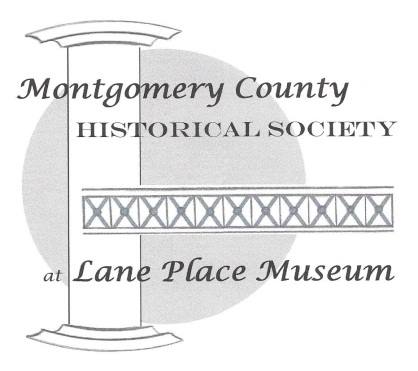Items in Remembering Lincoln that are transcribed.
from Apr. 20, 1865
Letter to Elizabeth, April 20, 1865
-
Full Title
Photocopy of handwritten, unsigned letter to Friend Elizabeth, April 20, 1865
-
Description
Photocopy of a handwritten, unsigned letter from a Union soldier in Harper Hospital, Detroit, Michigan, April 20, 1865 to Friend Elizabeth [perhaps the widow Lib (Mrs. Levi) Smith]. The writer enjoyed her letter and hopes she is well. He is sympathetic over the loss of both her cousin and husband. The writer may have served or been hospitalized with both of these men. He heard from home that the president was killed. He notes that some people rejoiced over the news and two soldiers were fined a month's pay each and jailed because they rejoiced. He hopes the war will soon end as drafting and enlisting has stopped. He wants out of the hospital, either to return home or to his unit. He notes several who are ill. He writes that both his father and brother are in service. He concludes the letter because his hand shakes so he cannot hold his pen and asks her to write soon. The letter is part of the Levi Smith Family Papers, 1851, 1903. Levi Smith (1832-March 10, 1865) was the first husband of Elizabeth "Lib". He moved to Elba Township (Lapeer County, Mich.) from Ohio. Together they had a daughter. Levi enlisted in Company I, First Michigan Engineers and Mechanics on December 23, 1862 as an artificer. He died of disease in Detroit on March 10, 1865. She then married another man, also with the surname of Smith, and had three more children.
-
Transcription
Page One
Harper Hospital
Detroit, Mich.
April 20, 1865
Friend Elizabeth
It is with great pleasure that i
now sit down to answer your
kind letter which which [sic] i received
yesterday it found me well as
usual and hoping these few lines
Will find you well. It is very
Warm to day [sic] it must been hard to
lose your Cousin but it was harder
to part with your husband so kind
and good. There was bad news home
that our president was killed.
There was some that rejoiced [sp?] over
his death. There was ttow [sic] soldiers here
that rejoyced [sic] over his death and
they put them in the guard house
and they took two [crossed out] one month's pay
Page Two
From your [sp?] friend Zachary [sp?] Bigelow
away from them i don't think that
this war will last long then we
all can go home to our friends,.
They have stoped [sic] drafting and
they have stoped [sic] enlisting. i think
that we will get our discharge. i have
put in for an examination. i hope they
Will give me my discharge or send
me to my regiment. i get sick
of hospital life. There is 5 [?] that
is in a bed now. There have but one
that is dangerously sick. Holister is
sick. he has been sick about a week.
I got a letter from home mother
had put her ankle out of joint she
will have it pretty hard till some
of us gets home. Father is in the
service and my Brother is two [sic]. i haven't
Heard from father since the last furlough [sp?]
i will have to close for this time my hand
Trembles so that i can't hold my pen still.
Excuse me for this short letter. Write soon
-
Source
Clarke Historical Library, Central Michigan University, Levi Smith Family Papers, 1851, 1903
-
Rights
This item may be reproduced and used for any purpose, including research, teaching, private study, publication, broadcast or commercial use, with proper citation and attribution.
-
Tags
-
Cite this Item
unknown, part of Levi Smith Family Papers, 1851, 1903. "Photocopy of handwritten, unsigned letter to Friend Elizabeth, April 20, 1865". Remembering Lincoln. Web. Accessed December 15, 2025. https://rememberinglincoln.fords.org/node/849
-
Creator
unknown, part of Levi Smith Family Papers, 1851, 1903
-
Date
1865
-
Material
Letter
-
Dimensions
original was 4.5x7 inches, the photocopy is 8.5x11 inches
from Apr. 20, 1865
Photocopy of handwritten, unsigned letter to Friend Elizabeth, April 20, 1865
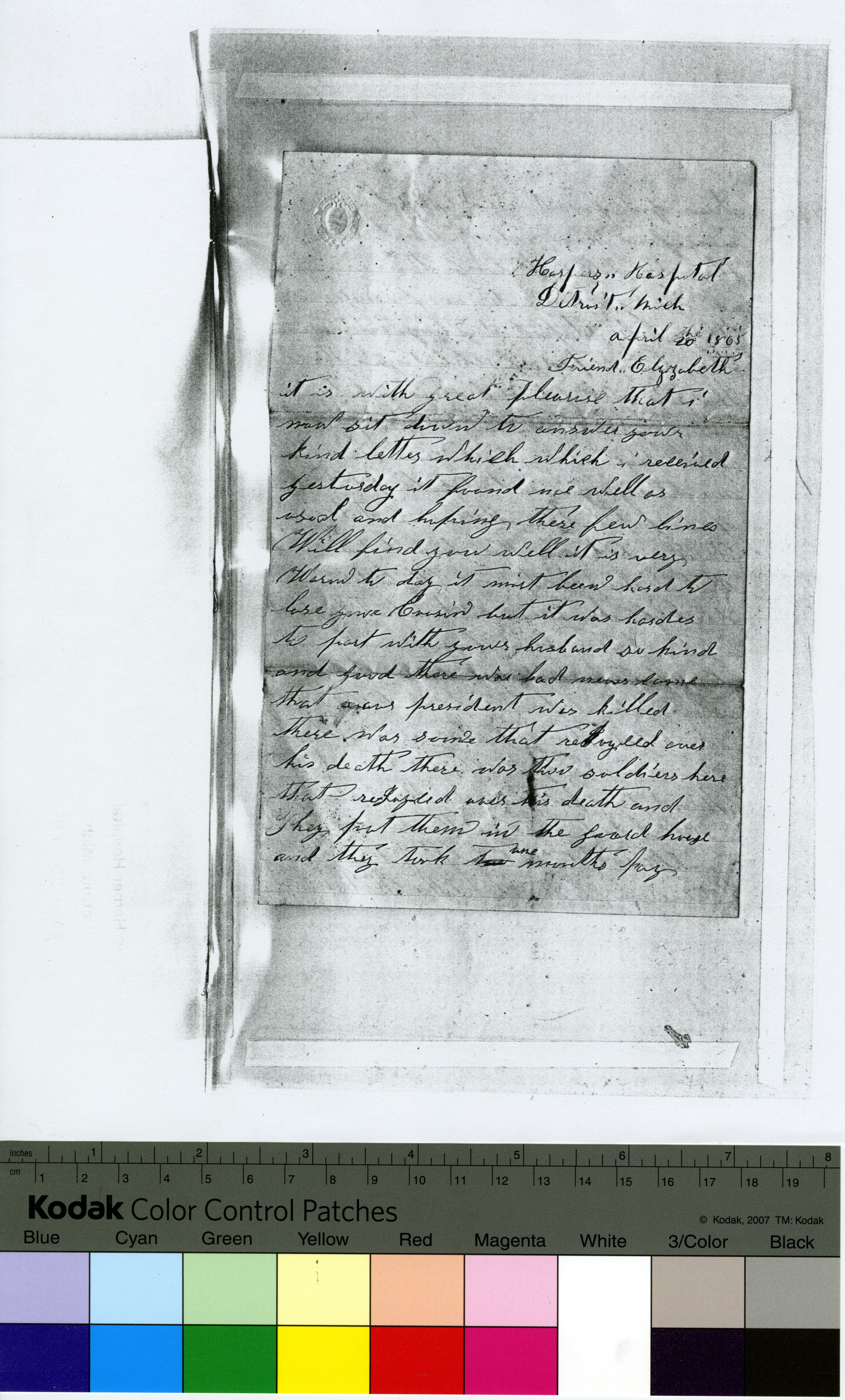
-
Description
Photocopy of a handwritten, unsigned letter from a Union soldier in Harper Hospital, Detroit, Michigan, April 20, 1865 to Friend Elizabeth [perhaps the widow Lib (Mrs. Levi) Smith]. The writer enjoyed her letter and hopes she is well. He is sympathetic over the loss of both her cousin and husband. The writer may have served or been hospitalized with both of these men. He heard from home that the president was killed. He notes that some people rejoiced over the news and two soldiers were fined a month's pay each and jailed because they rejoiced. He hopes the war will soon end as drafting and enlisting has stopped. He wants out of the hospital, either to return home or to his unit. He notes several who are ill. He writes that both his father and brother are in service. He concludes the letter because his hand shakes so he cannot hold his pen and asks her to write soon. The letter is part of the Levi Smith Family Papers, 1851, 1903. Levi Smith (1832-March 10, 1865) was the first husband of Elizabeth "Lib". He moved to Elba Township (Lapeer County, Mich.) from Ohio. Together they had a daughter. Levi enlisted in Company I, First Michigan Engineers and Mechanics on December 23, 1862 as an artificer. He died of disease in Detroit on March 10, 1865. She then married another man, also with the surname of Smith, and had three more children.
-
Source
Clarke Historical Library, Central Michigan University, Levi Smith Family Papers, 1851, 1903
-
Rights
This item may be reproduced and used for any purpose, including research, teaching, private study, publication, broadcast or commercial use, with proper citation and attribution.
-
Creator
unknown, part of Levi Smith Family Papers, 1851, 1903
-
Date
April 20, 1865
-
Material
Letter
-
Dimensions
original was 4.5x7 inches, the photocopy is 8.5x11 inches
from Apr. 16, 1865
Letter to his parents from J. D. McClure, April 16, 1865
-
Full Title
Handwritten Letter to Dear Parents from J. D. McClure, April 16, 1865
-
Description
Letter to his Dear (Unidentified) Parents from their son, J. D. McClure, April 16, 1865. McClure was in Memphis (Tenn.) setting up a business. He may have been from Iowa originally. McClure writes at first about moving to Memphis and having a tour of the town. Then he abruptly and emotionally transitions to having heard about the assassinations of President Lincoln, Seward, and Son that day from the boat coming from Cairo. He writes of the flags in town being at half-mast and draped in mourning [bunting]. McClure refers to the Secessionists as demons who will be destroyed by God. He then returns to the story of his tour of town, trying to help a lady find her husband at an unknown address, viewing the strong fortifications, battery, and garrison with lots of Union soldiers, the warm temperature and advanced state of growth in the trees and vegetables compared to those in the North, and how at present he has little business.
-
Transcription
Page One
Memphis, Tenn.
April 16th, 1865
Dear Parents:
I am here in the
beautiful city of Memphis in
the far flung South. I have
just got into the hotel from
a walk through the city
with a gentleman lawyer from
Michigan who has come
here to practice his profession.
Being acquainted he showed
many points of interest through
town. But Oh! Horror to
think of the awful calamnity [sic]
that has befallen our city[crossed out]
beloved country. In the assass-
ination of Lincoln Seward
and Son! The cold chills would
course my blood when first the
sad news reached my ears.
Page Two
2
The news first reached here this
morning on the boat from
Cairo. The news flew like
magic throughout the place
and the flags of the city were
hung at half mast, and
draped in mourning. What
horror to think our nation’s loss,
to see our Star Spangled banner
draped in mourning! “Whom
God will destroy he first maketh
mad”, and these demons, [of secession-inserted] are
surely sufficiently mad for
distruction [sic]. If possible I
will drive these thoughts away
for the present and write some-thing else. I got a carriage
this morning for Mrs. Billings
of Keohrels [sp?] who came down on
the same boat to visit her
husband. We rode for one hour
but did not succeed in finding
Page Three
3
as we had neither the name of
the street nor its number. But
we did see many most magnificent
business houses, Churches and residen-
ces. True I have not seen all
of the place by a considerable in
my hours ride, and two hours
walk. I have had a faint view
of the fortifications as I can have
now from my window. Yet,
Pickering is so situated as to
deal out distruction [sic] at a tremen-
dous rate to any foe the might
dare to approach from below or
above on the river, and it could
turn its mighty power from the
city to its utter demolition and
very hasty too. I see the large
guns standing upon the battery
ready at a single moments
warning, with its garrison of
over 3,000 soldiers within its
walls.
Page Four
Then how different the atmos-
phere here; the Sun is almost at
its meridian high to shining
forth its [genial-inserted] rays of warmth and
gladness. It is as warm here
as in June there, yet it is neither
sultry nor hot, but as I enhale [sic]
the atmosphere it seems cool
and embracing, much like we
sometimes have North just ater [sic]
a shower in a sultry hot
August day or the purer are [air-sic]
while the dew is rising in a
summers morning.
Then again how different
vegetation here; when I left
there was scarsely [sic] any of the
tees were putting forth their leaves
or buds, but before we reached this
point the peach and apple trees
had fruit put forth their blooms and
had fallen off. And to-day
the leaves on the oak and other
trees are almost full ground
and the gardens and yards are
green with grass and vegetables.
Page Four
But with all this I can’t tell
how I shall like the place.
I may not like the climate, the
the [sic] city, the practice to be had,
the people, nor the manner
of living. I do not know that
I have any occasion to be
discouraged unless it may be
from the high price of living.
It is Sunday and the most of
business is closed of course and
I am doing [sic] nothing in the way
of business. It will brobably [sic]
be one or two or perhaps three
weeks before I shall know
what to do. In the mean time
I shall enquire and remain
as contented as possible.
I guess it is dinner time.
I will write again when I
get more settled in business.
Your Affectionate son, J. D. McClure
-
Source
Clarke Historical Library, Central Michigan University, J. D. McClure Correspondence, 1865
-
Rights
This item may be reproduced and used for any purpose, including research, teaching, private study, publication, broadcast or commercial use, with proper citation and attribution.
-
Tags
-
Cite this Item
McClure, J. D.. "Handwritten Letter to Dear Parents from J. D. McClure, April 16, 1865". Remembering Lincoln. Web. Accessed December 15, 2025. https://rememberinglincoln.fords.org/node/848
-
Creator
McClure, J. D.
-
Date
1865
-
Material
Letter
-
Dimensions
8x9.5 inches
from Apr. 16, 1865
Handwritten Letter to Dear Parents from J. D. McClure, April 16, 1865
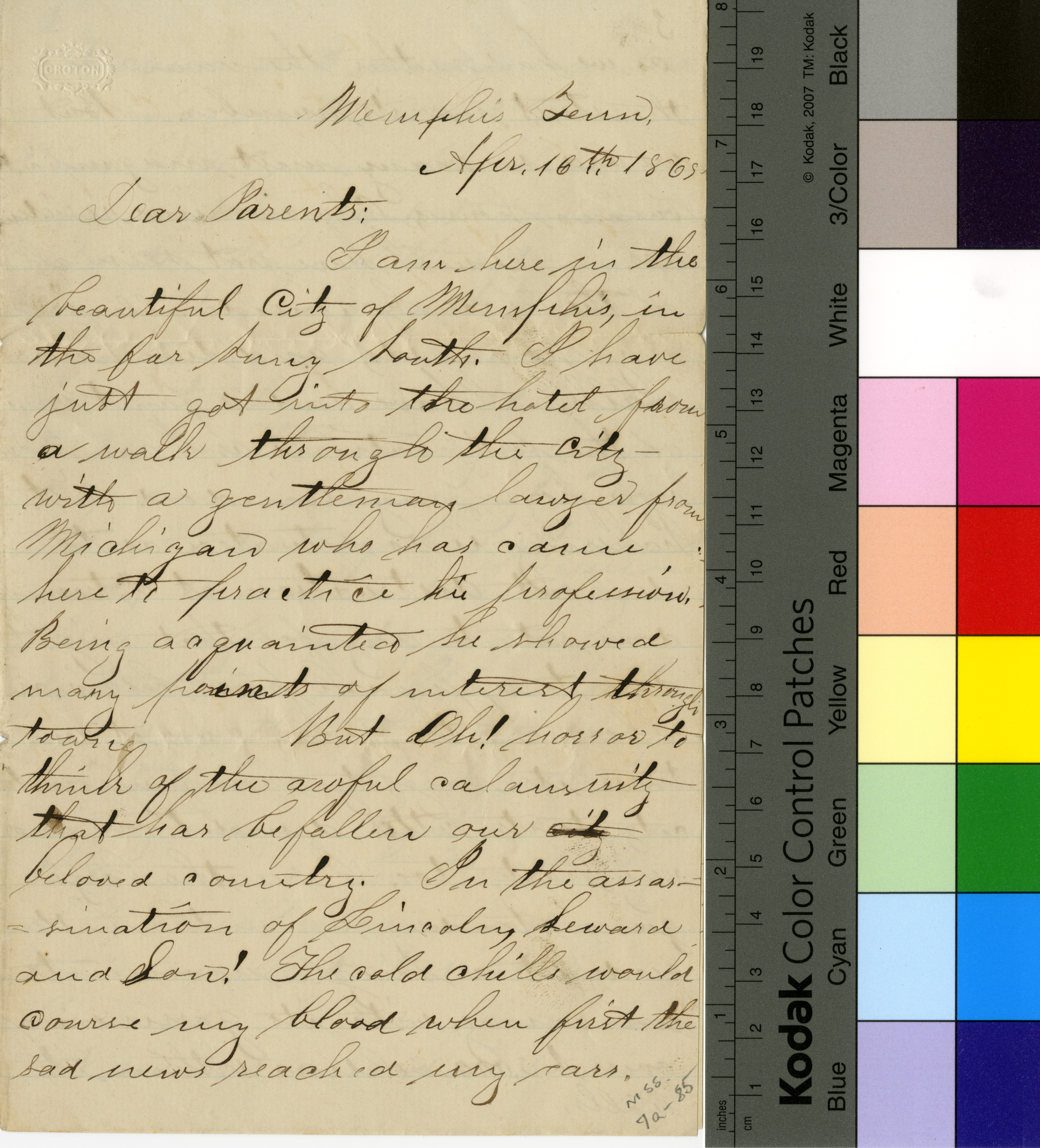
-
Description
Letter to his Dear (Unidentified) Parents from their son, J. D. McClure, April 16, 1865. McClure was in Memphis (Tenn.) setting up a business. He may have been from Iowa originally. McClure writes at first about moving to Memphis and having a tour of the town. Then he abruptly and emotionally transitions to having heard about the assassinations of President Lincoln, Seward, and Son that day from the boat coming from Cairo. He writes of the flags in town being at half-mast and draped in mourning [bunting]. McClure refers to the Secessionists as demons who will be destroyed by God. He then returns to the story of his tour of town, trying to help a lady find her husband at an unknown address, viewing the strong fortifications, battery, and garrison with lots of Union soldiers, the warm temperature and advanced state of growth in the trees and vegetables compared to those in the North, and how at present he has little business.
-
Source
Clarke Historical Library, Central Michigan University, J. D. McClure Correspondence, 1865
-
Rights
This item may be reproduced and used for any purpose, including research, teaching, private study, publication, broadcast or commercial use, with proper citation and attribution.
-
Creator
McClure, J. D.
-
Date
April 16, 1865
-
Material
Letter
-
Dimensions
8x9.5 inches
from Apr. 23, 1865
Letter to John Yarick from Reuben Yarick, April 23, 1865
-
Full Title
Handwritten Letter to John Yarick from his brother, Reuben Yarick, April 23, 1865
-
Description
Handwritten letter from Reuben Yarick, at Washington, D.C., to his brother, John Yarick, in Suffield, Portage County, Ohio. The letter describes Reuben's fears and feelings about the assassination of President Lincoln and visiting his body in the White House. This letter is part of Papers of John Yarick, 1854-1864. Reuben enlisted in Company G, 1st Michigan Infantry as a Sergeant on July 2, 1861 at Jackson (Mich.) age 25. He was wounded in action in 1864 and hospitalized at the U.S. Hospital, Hampton, Virginia. He was discharged from Company B, 24th VRC at Washington, D.C., on July 28, 1865. (This information is from Reuben's service record.)
-
Transcription
Page One
Washington, D. C., Aprl 23, 1865
Ever Dear Brother
Yours of the 16th is before
me and I am happy indeed to hear that
you are getting well again and your
family is recovering from its affliction
John I wrote a letter to you I think [inserted: two weeks ago]
that you have received it before this
time but I will write you a short
letter this evening yes John President
Lincoln is dead and you and [crossed out illegible words]
his remains are on it[sic] way to its last
resting place in the far west Springfield
Illinois they left here at eight -oclock
this [crossed out] yesterday morning I seen his
boddy [sic] at the White House last tuesday
or Wedensday [sic] it was conveyed to the
Capital the crowd of People was great the
procession was large and on thurday [sic]
his boddy [sic] lay in State at the Capital [sic]
and an emence [sic] swarm of People was
Page Two
their [sic] all day to get a last glimpse
of the once famous ruler of these
United States and our unhappy country
I went on Guard yesterday morning
at the old capital Prison and came
off this morning in the Prison nothing
but Rebel Prisoners of war are
confined and mostley [sic] all Rebell [sic]
officers from Second Lieutenant
to Generals and what little
opportunity that I had to speak to
them they all felt sorry and sayed [sic]
that to their opinion that the best
man for peace had gone and
did not think that the so called
Confederate Government had eneything [sic]
to do with the assassination and
was afraid that we would use them
pretty ruff [sic] we have allays [sic] used
prisoners of war well and I thing [sic]
that we allways [sic] will as long as they
will behave themselves two hundred
of these was sent off this morning
Page Three
for Johnson Island Ohio one Gen
was with the lot Gen Payn was
his name those two hundred was
all Officers.
Well John I don't know that i have
much more to write this time
their [sic] is a rumor now that the
V.R.C. will be mustard [sic] out soon
and if they do I will get out of the
Service but if the war continues
I will get in the Cavlrey [sic] if I can
I have one good arm yet and I can
fight it out had thought to quit
when I got out but this last cowardly
murder is enough to arouse evrey [sic]
Patriot's heart and fight as long as
he can raise an arm
Hoping that this will finde [sic] you
all well as it leaves me I will close
for this time my health is good at
present Remain as ever your
Devoted Brother
Sergt. Reuben Yarick
-
Source
Clarke Historical Library, Central Michigan University, John Yarick Papers, 1854-1864
-
Rights
This item may be reproduced and used for any purpose, including research, teaching, private study, publication, broadcast or commercial use, with proper citation and attribution.
-
Tags
-
Cite this Item
Yarick, Reuben. "Handwritten Letter to John Yarick from his brother, Reuben Yarick, April 23, 1865". Remembering Lincoln. Web. Accessed December 15, 2025. https://rememberinglincoln.fords.org/node/847
-
Creator
Yarick, Reuben
-
Date
1865
-
Material
Letter
-
Dimensions
8x10 inches
from Apr. 23, 1865
Handwritten Letter to John Yarick from his brother, Reuben Yarick, April 23, 1865
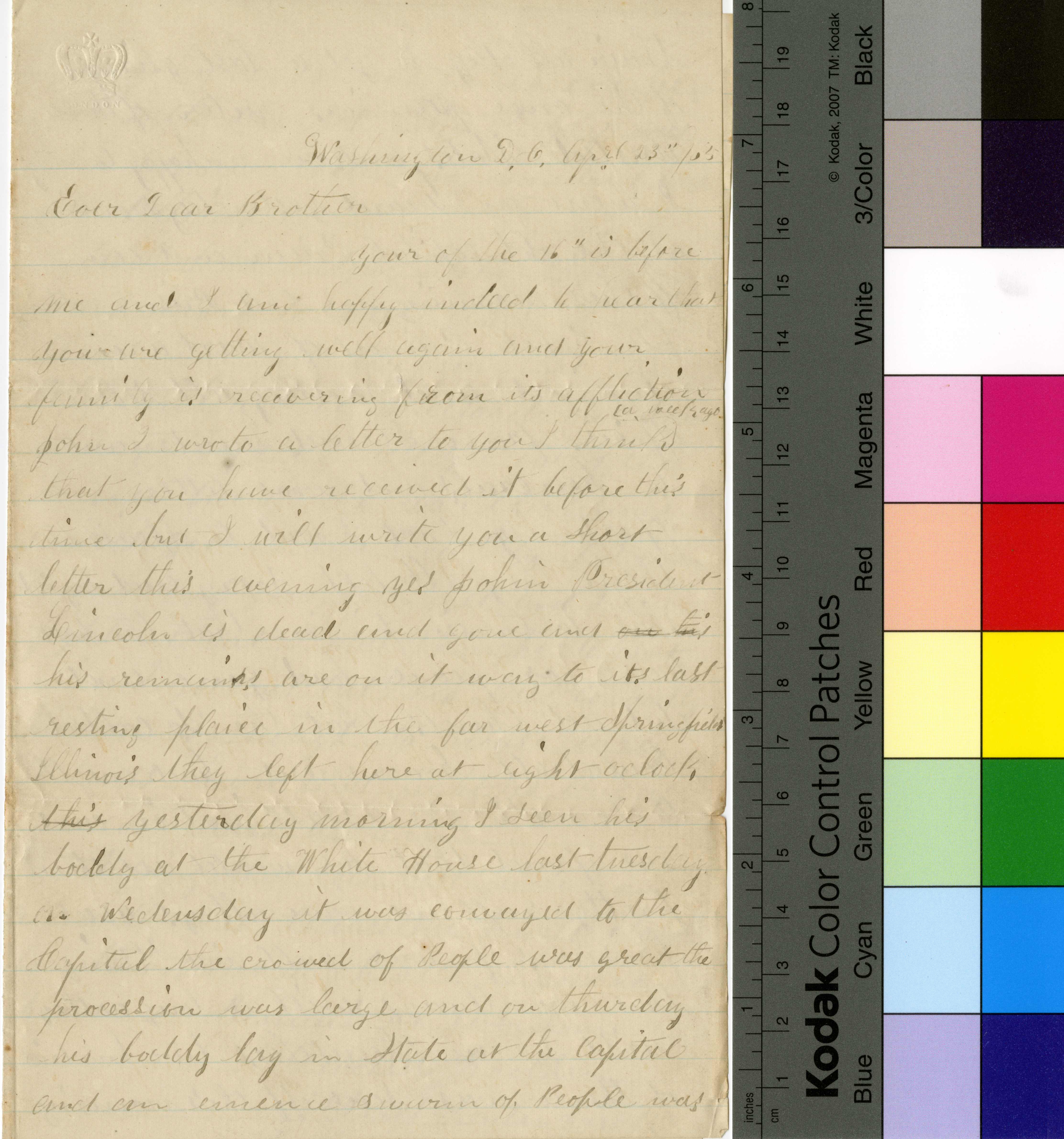
-
Description
Handwritten letter from Reuben Yarick, at Washington, D.C., to his brother, John Yarick, in Suffield, Portage County, Ohio. The letter describes Reuben's fears and feelings about the assassination of President Lincoln and visiting his body in the White House. This letter is part of Papers of John Yarick, 1854-1864. Reuben enlisted in Company G, 1st Michigan Infantry as a Sergeant on July 2, 1861 at Jackson (Mich.) age 25. He was wounded in action in 1864 and hospitalized at the U.S. Hospital, Hampton, Virginia. He was discharged from Company B, 24th VRC at Washington, D.C., on July 28, 1865. (This information is from Reuben's service record.)
-
Source
Clarke Historical Library, Central Michigan University, John Yarick Papers, 1854-1864
-
Rights
This item may be reproduced and used for any purpose, including research, teaching, private study, publication, broadcast or commercial use, with proper citation and attribution.
-
Creator
Yarick, Reuben
-
Date
April 23, 1865
-
Material
Letter
-
Dimensions
8x10 inches
from Aug. 12, 1865
Diary of Qunicy A. Moore, 1865, 1869
-
Full Title
Handwritten Diary of Quincy A. Moore,1866, 1869
-
Description
Diary entry of Aug. 12, 1865 describes how Moore attended the Dan Rice Great Show [a circus] and saw a sideshow tableaux of the assassination of President Lincoln in Bellefontaine, Ohio. [Note: Dan Rice is one of the greatest Civil War era clowns. He dressed and looked like our image of Uncle Sam.] Moore may have been a school district official in Logan County, Ohio. He regularly visited West Liberty, Bellefontaine, Lake Branch, and Degraff, Ohio. His diary, March 19, 1865-Oct. 1, 1869, gives a daily account of his farming, church, family, social life, and illness in Ohio.
-
Transcription
Aug. 12, 1865.
I was at Bellefontain [sic] to the show Dan Rice Great Show I saw Elephants Lions Bear wild cat yak camels buffalo monkeys Leopard Congerooh [Kangaroo]and a Blind Horse witch [which] was taught to under stand [sic] english language and a variety of other animals and I was in the side shows in one of them I saw the Representation of the assassination of Lincoln and also of secretary Seward it looked most horrible in the other side show I saw the albino family and a boy sixteen years old witch [which]was eightteen [sic]inches high the girl twenty two inches high seventeen years old a cat witch [which] had but two legs naturaly [sic] born so and a monkey go through military performance [sic] and a woman with beard it cost me for all I seen and bought just 50 [cents]
-
Source
Clarke Historical Library, Central Michigan University, Quincy A. Moore Diary, 1865, 1869
-
Rights
This item may be reproduced and used for any purpose, including research, teaching, private study, publication, broadcast or commercial use, with proper citation and attribution.
-
Tags
-
Cite this Item
Moore, Quincy A., d. 1877. "Handwritten Diary of Quincy A. Moore,1866, 1869". Remembering Lincoln. Web. Accessed December 15, 2025. https://rememberinglincoln.fords.org/node/846
-
Creator
Moore, Quincy A., d. 1877
-
Date
1865
-
Material
Diary
-
Dimensions
12x7.5 inches
from Aug. 12, 1865
Handwritten Diary of Quincy A. Moore,1866, 1869
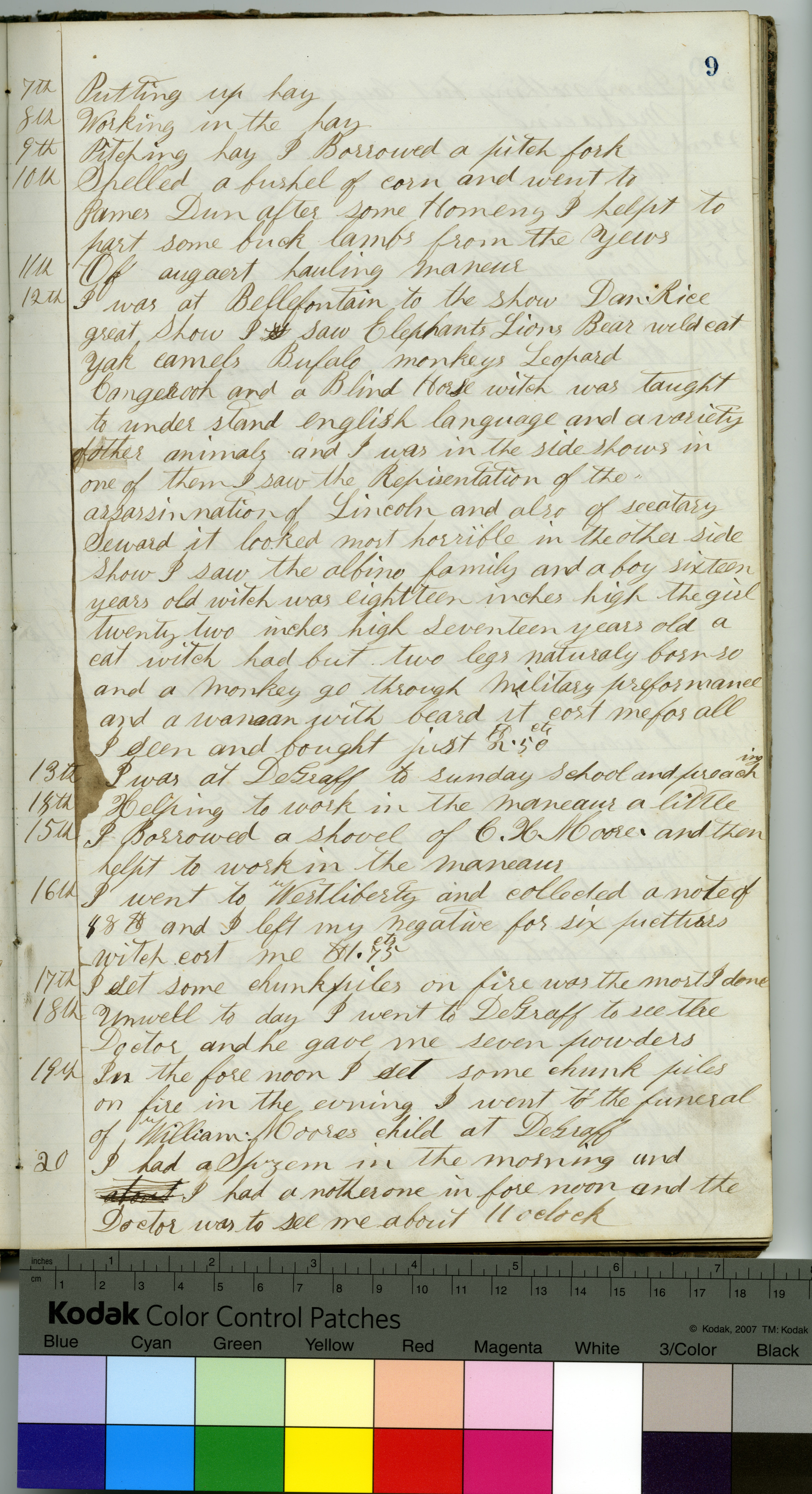
-
Description
Diary entry of Aug. 12, 1865 describes how Moore attended the Dan Rice Great Show [a circus] and saw a sideshow tableaux of the assassination of President Lincoln in Bellefontaine, Ohio. [Note: Dan Rice is one of the greatest Civil War era clowns. He dressed and looked like our image of Uncle Sam.] Moore may have been a school district official in Logan County, Ohio. He regularly visited West Liberty, Bellefontaine, Lake Branch, and Degraff, Ohio. His diary, March 19, 1865-Oct. 1, 1869, gives a daily account of his farming, church, family, social life, and illness in Ohio.
-
Source
Clarke Historical Library, Central Michigan University, Quincy A. Moore Diary, 1865, 1869
-
Rights
This item may be reproduced and used for any purpose, including research, teaching, private study, publication, broadcast or commercial use, with proper citation and attribution.
-
Creator
Moore, Quincy A., d. 1877
-
Date
August 12, 1865
-
Material
Diary
-
Dimensions
12x7.5 inches
from May. 4, 1865
Edgar Lincoln Letter
-
Full Title
Edgar Lincoln Letter
-
Description
This letter from Edgar to his brother and sister discussing his recent activities near St. Paul, Minnesota, including the assassination of President Lincoln. Edgar notes that the news of Lincoln's death has stunned the local populace. Edgar goes on to note that he is willing to follow his brother in regards to management of land they hold in Minnesota, that he feels may drive him into debt.
-
Transcription
Thursday Eve,
St. Paul May 4, 1865 -
Dear Bro. & Sister
Your letter of April 25, I have just received. as it went to
Shakopee I did not get it quite so soon. I was very glad to hear from You, and am
rejoiced to know that you have returned in Safty. A letter from Augusta a few days
since informed me of Your being at Brewster and of Your good health. Isaac and
family are all well, or were Monday Morning. I left S - with about 400 Bbls lime
the 26 . April. put of 70 Bbls at the Fort. and have sold about 140 here. it goes
of very slow now and I dont know what to make of it, as it was generally supposed
this spring that there was going to be a good deal of building down here this year .
The news of the Murder of our good President has knocked every thing in head, and
people do not like to do any thing until they know how things are going to turn
out. I have brought down 720 Bbls before this trip, which sold for $1.50 per Bbl,
most of which we got the money for. Since I have been here this time Reice has been
here and made contract with most of the large masons to furnish them with lime for one
Year at $1.10 and so we shall have opposition again to contend with. He is a d - - d
jackass, but like all the rest of the Dutchmen here afraid that we shall make any thing.
With wood, labor, and every thing else at high as it is now, our lime costs us 86 cts
here . How long the d - - d fool will hold out against us or wheather it will be for
our interest to burn, or sell out the whole concern Isaac and I have not decided yet.
Isaac is getting about discouraged as well as myself, and it is no wonder that we do.
I feel made enough to work this summer for nothing, more than a living and if
Isaac has not such a large family I should want him to, and give Reice fitts.
I shall send Isaac Your letter tomorrow and let him answer You in regards to buying
Your part. As I have no desire to run in debt to possess more property in this
place I should be glad to take $1000, for my interest in the concern, on the same
terms that you offer yours. I shall write Isaac to answer You immediately at Boston
care of Crosby.
I would not go in the Bark again if they would not give me more
wages, but get a vessel and go the same as Allison does. I should have probably
been in Calcutta now, but Augusta was not well enough to go with me and as we have
but one life to live here we thought we might as well be together once in a while,
or try to be at any rate, as it is I dont know as we shall as Father Snow is so unwell.
I think it her duty to stay at home, at present, I suppose that I can bear
the cross, but think that all of us have had our share of them. I am very sorry that
Lucinda has a cough and hope that she will take good care of herself. I hope that
Free will come home from Spain, I am writing in the Cabin of the old flat Boat. and
expect to make it my home here until the misquitoes come. Shall try and not let the
faithfull old boat sink. Write on receipt of this to S - Tell Anthony that I am hearty
and hope that he is the same, and when he wants a mate to let me know. Give my love to
Mother and all enquiring friends. Please dont let the contents of this letter get out
much in Brewster, as it would be nuts for those busy bodies, and I dont intend to
furnish them any without paying for them with my best wishes for your good health
and prosperity, Freeman Your aff. Bro. Edgar -
Source
-
Rights
This item may be reproduced and used for any purpose, including research, teaching, private study, publication, broadcast or commercial use, with proper citation and attribution.
-
Tags
-
Cite this Item
Edgar Lincoln. "Edgar Lincoln Letter". Remembering Lincoln. Web. Accessed December 15, 2025. https://rememberinglincoln.fords.org/node/845
-
Creator
Edgar Lincoln
-
Date
May 4, 1865
from May. 4, 1865
Edgar Lincoln Letter
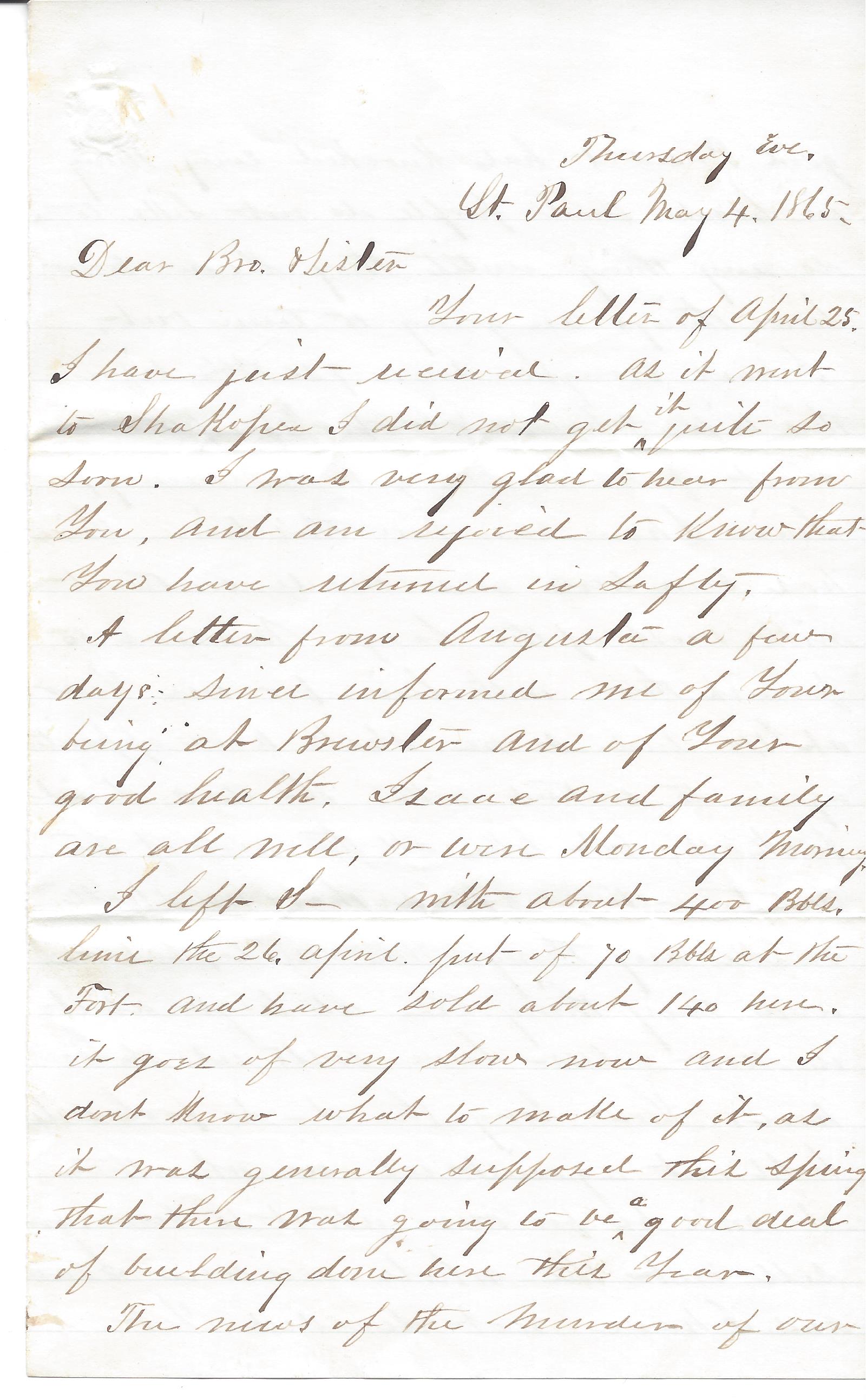
-
Description
This letter from Edgar to his brother and sister discussing his recent activities near St. Paul, Minnesota, including the assassination of President Lincoln. Edgar notes that the news of Lincoln's death has stunned the local populace. Edgar goes on to note that he is willing to follow his brother in regards to management of land they hold in Minnesota, that he feels may drive him into debt.
-
Source
-
Rights
This item may be reproduced and used for any purpose, including research, teaching, private study, publication, broadcast or commercial use, with proper citation and attribution.
-
Creator
Edgar Lincoln
-
Date
May 4, 1865
from Apr. 27, 1865
Joseph Lincoln Letter to Wife
-
Full Title
Joseph Lincoln Letter to Wife
-
Description
This letter from Captain Joseph Lincoln to his wife talks about his experiences as a merchant sea captain towards the end of the Civil War. Captain Lincoln mentions the death of John Wilkes Booth in his letter as well as his hope that the assassin would have been taken alive.
-
Transcription
Boston April 27th /65
My Dear Wife,
Have been looking for a letter from you yesterday & to day, but none
came. suppose that you are busy getting ready for another voyage. do not know where
she will go the next voyage, but there is some talk of her going to Philadelphia. to
load coal for New Orleans, if so think you had better go as far as Philadelphia with
me. If the weather continues good shall be all discharged by Saturday night. then
I suppose it will be driving times till they get her away. Have not settled with them
yet but see that they have the voyage made up and charged me the rate of exchange
on all money drawn away. Which bring me in debt to the ship. instead of having
5 or $600 coming to me, but I do not think that is the way they intend to settle with
me, if they do I want to make one more voyage for them and pay myself, that I should
call mean enough would make my wages less then $40 pr month Sailors are getting $50.
but will say no more till I know what they intend to do. to day we have the news that
they have got Booths body which is good. but was in hopes they would have taken him
alive. Write me so that I can get it Saturday night to the Webster House, Emma has a
little girl
Yours affectionate
Husband
Joseph L. Lincoln -
Source
-
Rights
This item may be reproduced and used for any purpose, including research, teaching, private study, publication, broadcast or commercial use, with proper citation and attribution.
-
Tags
-
Cite this Item
Joseph Lincoln. "Joseph Lincoln Letter to Wife". Remembering Lincoln. Web. Accessed December 15, 2025. https://rememberinglincoln.fords.org/node/844
-
Creator
Joseph Lincoln
-
Date
April 27, 1865
from Apr. 27, 1865
Joseph Lincoln Letter to Wife
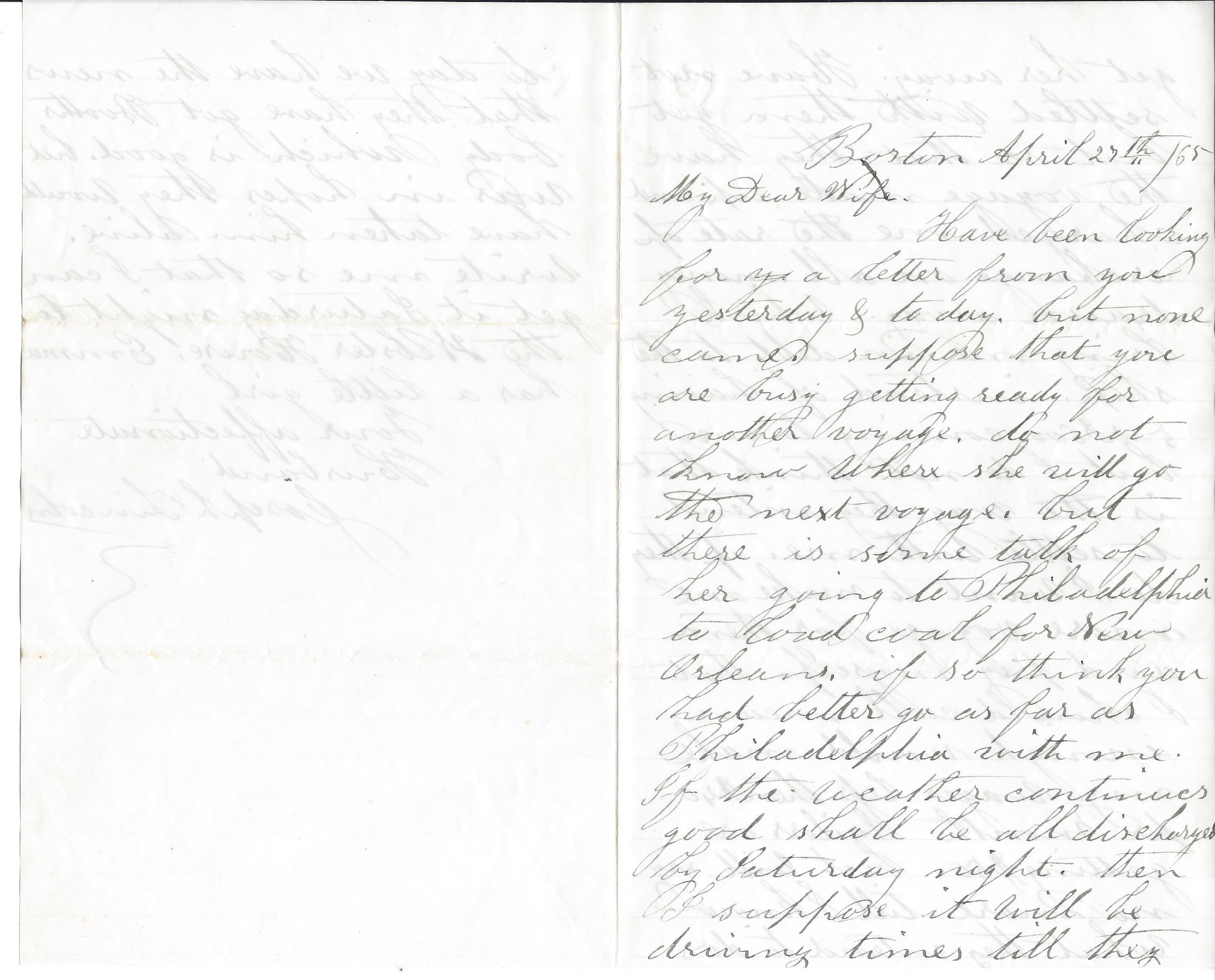
-
Description
This letter from Captain Joseph Lincoln to his wife talks about his experiences as a merchant sea captain towards the end of the Civil War. Captain Lincoln mentions the death of John Wilkes Booth in his letter as well as his hope that the assassin would have been taken alive.
-
Source
-
Rights
This item may be reproduced and used for any purpose, including research, teaching, private study, publication, broadcast or commercial use, with proper citation and attribution.
-
Creator
Joseph Lincoln
-
Date
April 27, 1865
from Apr. 15, 1865
New York Herald 1865
-
Full Title
New York Herald 1865
-
Description
New York Herald newspaper regarding the Lincoln assassination and identifying John Wilkes Booth as the shooter.
-
Transcription
"IMPORTANT. ASSASSINATION OF PRESIDENT LINCOLN. The President Shot at the Theatre Last Evening. SECRETARY SEWARD DAGGERED IN HIS BED, BUT NOT MORTALLY WOUNDED. Clarence and Frederick Seward Badly Hurt. ESCAPE OF THE ASSASSINS. Intense Excitement in Washington. Scene at the Deathbed of Mr. Lincoln. J. Wilkes Booth, the Actor, the Alleged Assassin of the President."
"Major General Dix, New York:-
This evening at about 9:30 P.M., at Ford's Theatre, the President, while sitting in his private box with Mrs. Lincoln, Mrs. Harris and Major Rathburn, was shot by an assassin, who suddenly entered the box and approached behind the President. The assassin then leaped upon the stage, brandishing a large dagger or knife, and made his escape in the roar of the theatre. The pistol ball entered the back of the President's bead and penetrated nearly through the head. The wound is mortal. The President has been insensible ever since it was inflicted, and is now dying. About the same hour an assassin, wheahter the same or not, entered Mr. Seward's apartments, and under pretense of having a prescription, was shown to the Secretary's sick chamber. The assassin immediately rushed to the bed and inflicted two or three stabs on the throat and two on the face. It is hoped the wounds may not be mortal. My _______ is that they will prove fatal. ___a nurse alarmed Mr. Frederick Seward, who was in an adjoining room, and he hastened to the door of his father's room, when he met the assassin, who inflicted upon him one or more dangerous wounds. The recovery of Frederick Seward is doubtful. It is not probable that the President will live through the night. General Grant and wife were advertised to be at the theatre this evening, but he started to Burlington at six o'clock this evening. At a Cabinet meeting, at which General Grant was present, the subject of the state of the country and the prospect of a speedy peace were discussed. The President was very cheerful and hopeful, and spoke very kindly of General Lee and others of the confederacy, and of the establishment of government in Virginia. All the members of the Cabinet except Mr. Seward, are now in attendance upon the President. I have seen Mr. Seward, but he and Frederick were both unconscious.- Edwin M. Stanton, Secretary of War."
"POSTSCRIPT. DEATH OF THE PRESIDENT!! Condition of Secretary Seward. Ten Thousand Dollars Reward Offered for the Arrest of the Assassins. J. Wilkes Booth Identified as the Murderer of the President."
"To Major General Dix:-
The President continues insensible and is sinking. Secretary Seward remains without change. Fredrick Seward's skill is fractured in two places, besides a severe cut upon the head. The attendant is still alive but hopeless. Major Seward's wounds not dangerous. It is now ascertained with reasonable certainty that two assassins were engaged in the horrible crime, Wilkes Booth being the one that shot the President, and the other a companion of his whose name is not known, but whose description is so clear that he can hardly escape. It appears from a letter found in Booth's trunk that the murder was planned before the 4th of March, but fell through then because the accomplice backed out until "Richmond could be heard from." Booth and his accomplice were at the livery ____ at six o'clock last evening, and left there with their horses about ten o'clock, or shortly before that hour. It would appear that they had for several days been seeking their chance,but for some unknown reason it was not carried into effect until last night. One of them has evidently made his way to Baltimore-the other has not yet been traced.---Edwin M. Stanton, Secretary of War."
"To Major General Dix, New York:-
Abraham Lincoln died this morning at twenty-two minutes after seven o'clock.---Edwin M. Stanton, Secretary of War."
"Our Special Washington Despatch. Washington, April 15-8 A.M.
The President died at half-past seven o'clock this morning. The bells throughout the city are tolling. The public departments and most of the places of business are closed. Secretary Seward is pretty comfortable this morning, the wounds inflicted upon him not being dangerous in themselves, but serious for his advanced age and previously weak-condition. Mr. Frederick Seward is very dangerously wounded, his skull having been fractured by a blow from the butt of a pistol in the hand of the assassin. The most profound sensation prevails here and the deepest realization of the irreparable loss which the nation has sustained pervades the minds of the people." -
Source
Montgomery County Historical Society
-
Rights
Use of this item for research, teaching, and private study is permitted with proper citation. Reproduction of the item requires our written permission for publication, broadcast or commercial use. Request for such must be made in writing, outlining in detail the items to be reproduced and requested use of the reproduction. For permission, please contact Victoria Johnston at vjohnston@lane-mchs.org.
-
Tags
-
Cite this Item
U.S. Department of War, Washington D.C.. "New York Herald 1865". Remembering Lincoln. Web. Accessed December 15, 2025. https://rememberinglincoln.fords.org/node/839
from Apr. 15, 1865
New York Herald 1865
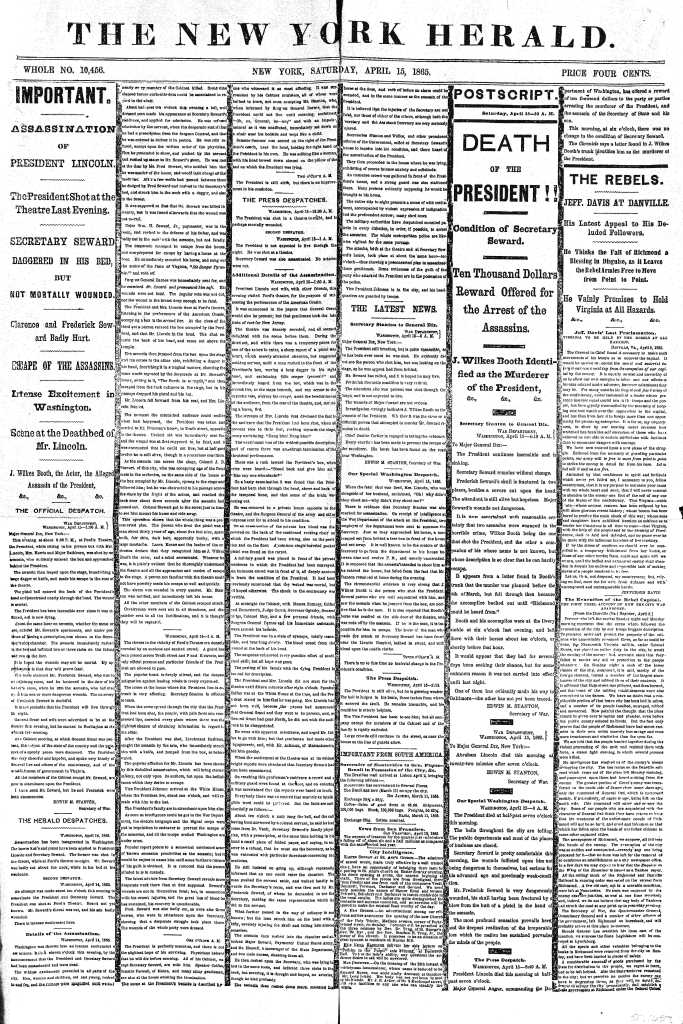
-
Description
New York Herald newspaper regarding the Lincoln assassination and identifying John Wilkes Booth as the shooter.
-
Source
Montgomery County Historical Society
-
Rights
Use of this item for research, teaching, and private study is permitted with proper citation. Reproduction of the item requires our written permission for publication, broadcast or commercial use. Request for such must be made in writing, outlining in detail the items to be reproduced and requested use of the reproduction. For permission, please contact Victoria Johnston at vjohnston@lane-mchs.org.
-
Creator
U.S. Department of War, Washington D.C.
-
Date
April 15, 1865
from
Joanna Lane's original "Lincoln Memories" letter
-
Full Title
Joanna Lane's original "Lincoln Memories" letter
-
Description
Page three of the original, handwritten "Lincoln Memories" letter by Mrs. Henry S. Lane Feb 1909
-
Transcription
Many unjust criticisms have been cast upon Mrs. Lincoln while in the White House. She made a great mistake soon after going there when the newspapers reported she was to give a large ball in the East room - but Secretary Seward and other judicious advisers persuaded her to omit the dancing and have only the ordinary reception. This was early in the war and the public conscience was shocked with this appearance of levity and indifference to the weeping and wailing all around us. Mrs. Lincoln was born in Ky and had succession relatives there but she was true to her husband and country loyal to the country but unhappily could not attach women to her, was cold and unresponsive in temperament.
-
Source
Montgomery County Historical Society
-
Rights
Use of this item for research, teaching, and private study is permitted with proper citation. Reproduction of the item requires our written permission for publication, broadcast or commercial use. Request for such must be made in writing, outlining in detail the items to be reproduced and requested use of the reproduction. For permission, please contact Victoria Johnston at vjohnston@lane-mchs.org.
-
Tags
-
Cite this Item
Joanna Lane. "Joanna Lane's original "Lincoln Memories" letter". Remembering Lincoln. Web. Accessed December 15, 2025. https://rememberinglincoln.fords.org/node/828
from
Joanna Lane's original "Lincoln Memories" letter
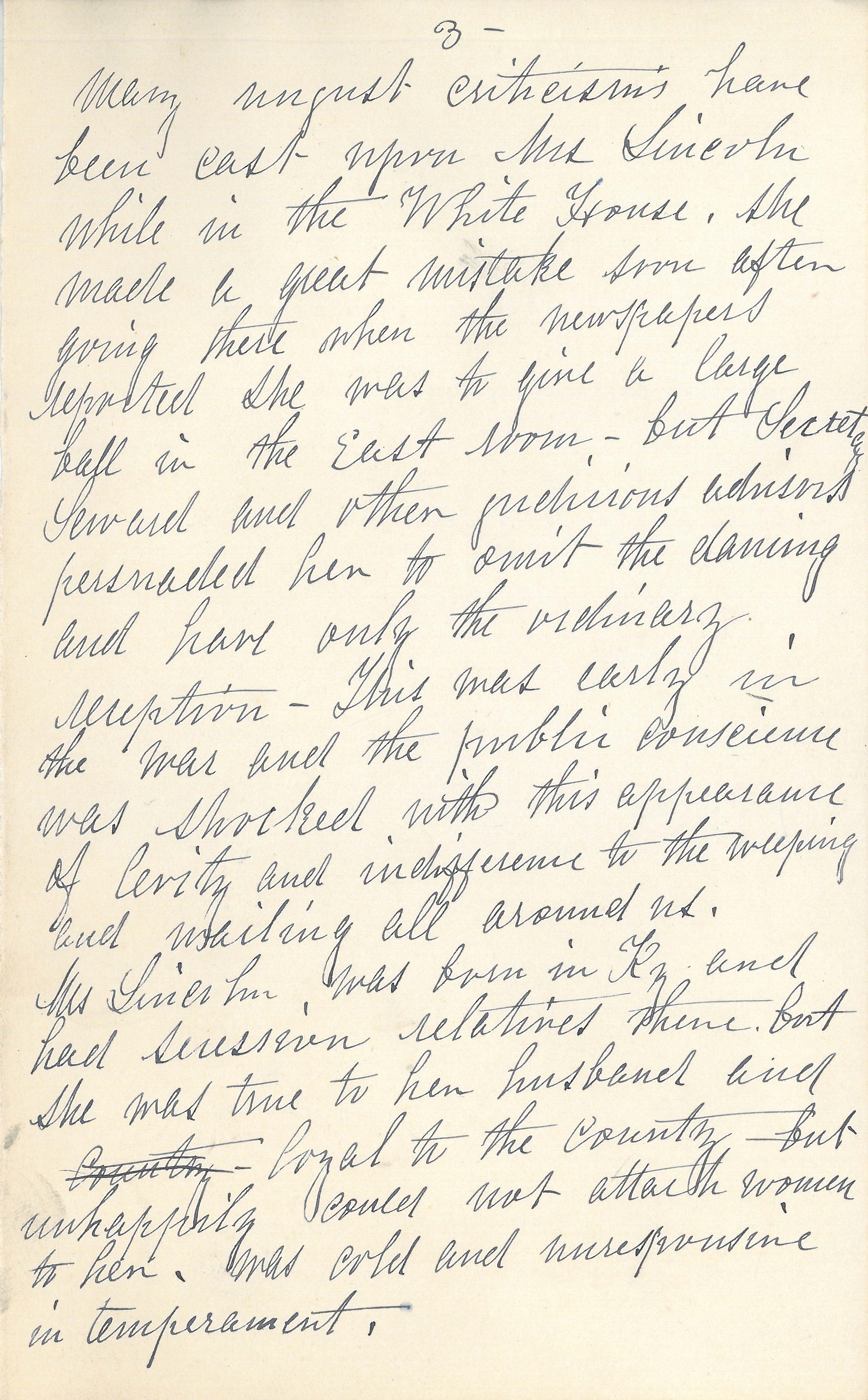
-
Description
Page three of the original, handwritten "Lincoln Memories" letter by Mrs. Henry S. Lane Feb 1909
-
Source
Montgomery County Historical Society
-
Rights
Use of this item for research, teaching, and private study is permitted with proper citation. Reproduction of the item requires our written permission for publication, broadcast or commercial use. Request for such must be made in writing, outlining in detail the items to be reproduced and requested use of the reproduction. For permission, please contact Victoria Johnston at vjohnston@lane-mchs.org.
-
Creator
Joanna Lane
from
Joanna Lane's original "Lincoln Memories" letter
-
Full Title
Joanna Lane's original "Lincoln Memories" letter
-
Description
Page one of the original, handwritten "Lincoln Memories" letter by Mrs. Henry S. Lane Feb 1909
-
Transcription
The Swiss Government in passing resolutions of condolence on the death of Lincoln said "he was the man with the brow of iron, and the heart of gold. These were words fitly spoken and all who ever came in contact with him recognized the divine charity which forgives all sin and pities all suffering. If he ever erred it was on the side of mercy in pardoning rebels whom others had convicted and thought guilty of severe punishment many women came to him during that awful war of Rebellion asking him to commute the sentence passed upon a beloved husband or son. Always their requests were granted
-
Source
Montgomery County Historical Society
-
Rights
Use of this item for research, teaching, and private study is permitted with proper citation. Reproduction of the item requires our written permission for publication, broadcast or commercial use. Request for such must be made in writing, outlining in detail the items to be reproduced and requested use of the reproduction. For permission, please contact Victoria Johnston at vjohnston@lane-mchs.org.
-
Tags
-
Cite this Item
Joanna Lane. "Joanna Lane's original "Lincoln Memories" letter". Remembering Lincoln. Web. Accessed December 15, 2025. https://rememberinglincoln.fords.org/node/827
from
Joanna Lane's original "Lincoln Memories" letter
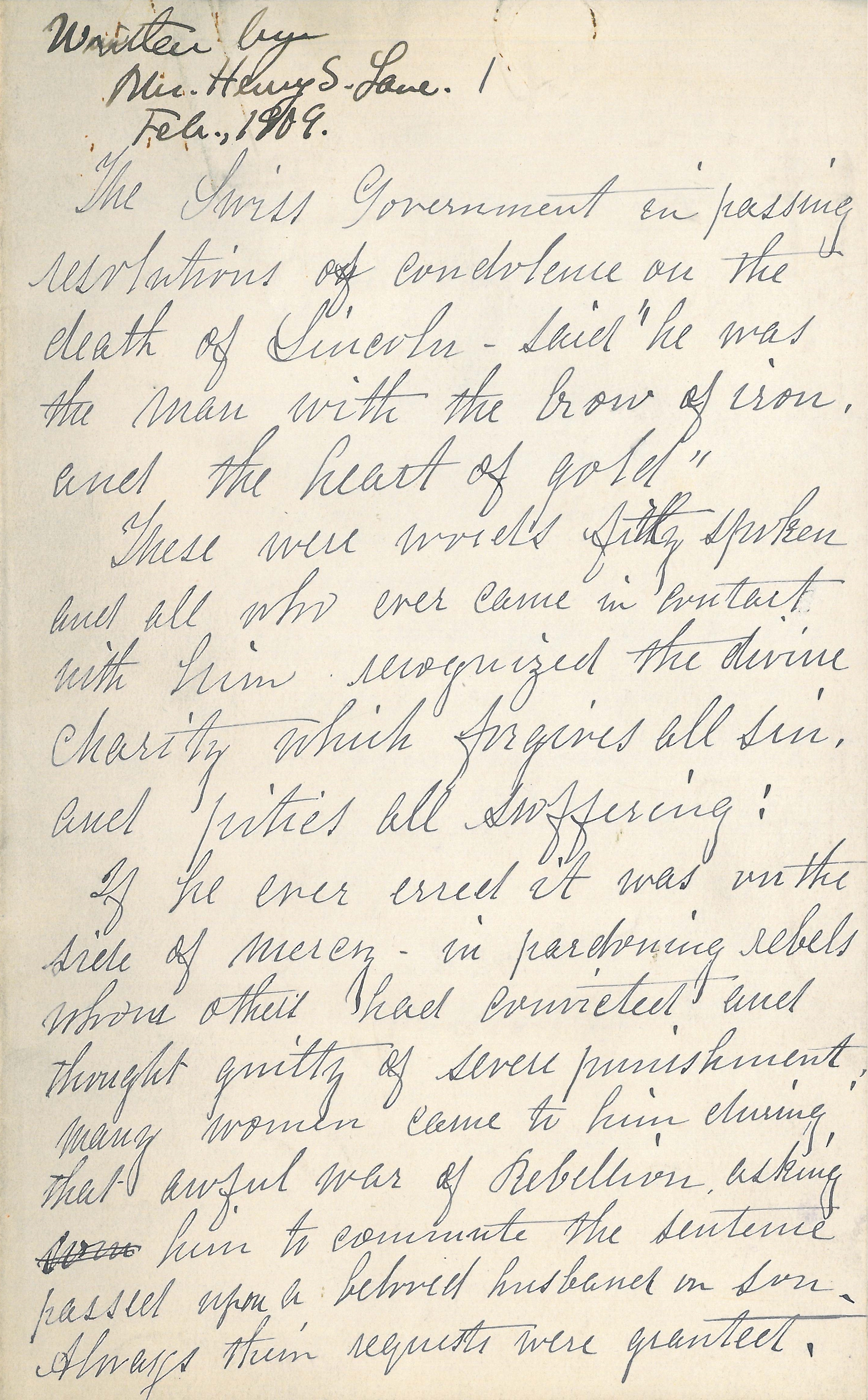
-
Description
Page one of the original, handwritten "Lincoln Memories" letter by Mrs. Henry S. Lane Feb 1909
-
Source
Montgomery County Historical Society
-
Rights
Use of this item for research, teaching, and private study is permitted with proper citation. Reproduction of the item requires our written permission for publication, broadcast or commercial use. Request for such must be made in writing, outlining in detail the items to be reproduced and requested use of the reproduction. For permission, please contact Victoria Johnston at vjohnston@lane-mchs.org.
-
Creator
Joanna Lane
from
"Lincoln Memories"
-
Full Title
"Lincoln Memories"
-
Description
Joanna Lane remembers Abraham Lincoln in her "Lincoln memories" after his assassination.
-
Transcription
“Lincoln” Memories – By Mrs. Henry S. Lane
The Swiss Government in passing resolutions of condolence on the death of Lincoln said – “he was the man with the brow of iron and the heart of gold”.
These were words fitly spoken and all who ever came in con-tact with him recognized the divine charity which forgives all sin and pities all suffering.
If he ever erred it was on the side of mercy in pardoning rebels whom others had convicted and thought guilty of severe pun-ishment. Many women came to him during that awful War of Rebel-lion asking him to commute the sentence passed upon a beloved hus-band or son. Always their request were granted.
After the battle of Shiloh, April 6-7, 1862, the report came to Washington that Lew Wallace was killed in that terrible slaught-er. Mr. Lane hearing it went up to inquire of Sen. Stanton it was true- he found President Lincoln there at the War office on the same errand. Later they learned it was Wallace from Illinois who had been killed. Mr. Lane said he was thankful it was not our Wallace. But, replied Mr. Lincoln, “it was somebody’s Wallace.” He sympathized with all who mourned the death of this true patriot in that fearful battle. As you have heard many times, his distinguishing characteristics were gentleness and humility.
Many unjust criticisms have been cast upon Mrs. Lincoln while in the Whits House. She made a great mistake soon after going there where the newspapers reported she was to give a large ball in the East room-but Secretary Seward and other judicious advisors persuaded her to omit the dancing and have only the ordinary re-ception. This was early in the War and the public conscience was shocked with this appearance of levity and indifference to the weeping and wailing all around us.
[Transcription by Alicia B., Ford's Theatre Society.] -
Source
Montgomery County Historical Society
-
Rights
Use of this item for research, teaching, and private study is permitted with proper citation. Reproduction of the item requires our written permission for publication, broadcast or commercial use. Request for such must be made in writing, outlining in detail the items to be reproduced and requested use of the reproduction. For permission, please contact Victoria Johnston at vjohnston@lane-mchs.org.
-
Tags
-
Cite this Item
Joanna Lane. ""Lincoln Memories"". Remembering Lincoln. Web. Accessed December 15, 2025. https://rememberinglincoln.fords.org/node/822
from
"Lincoln Memories"
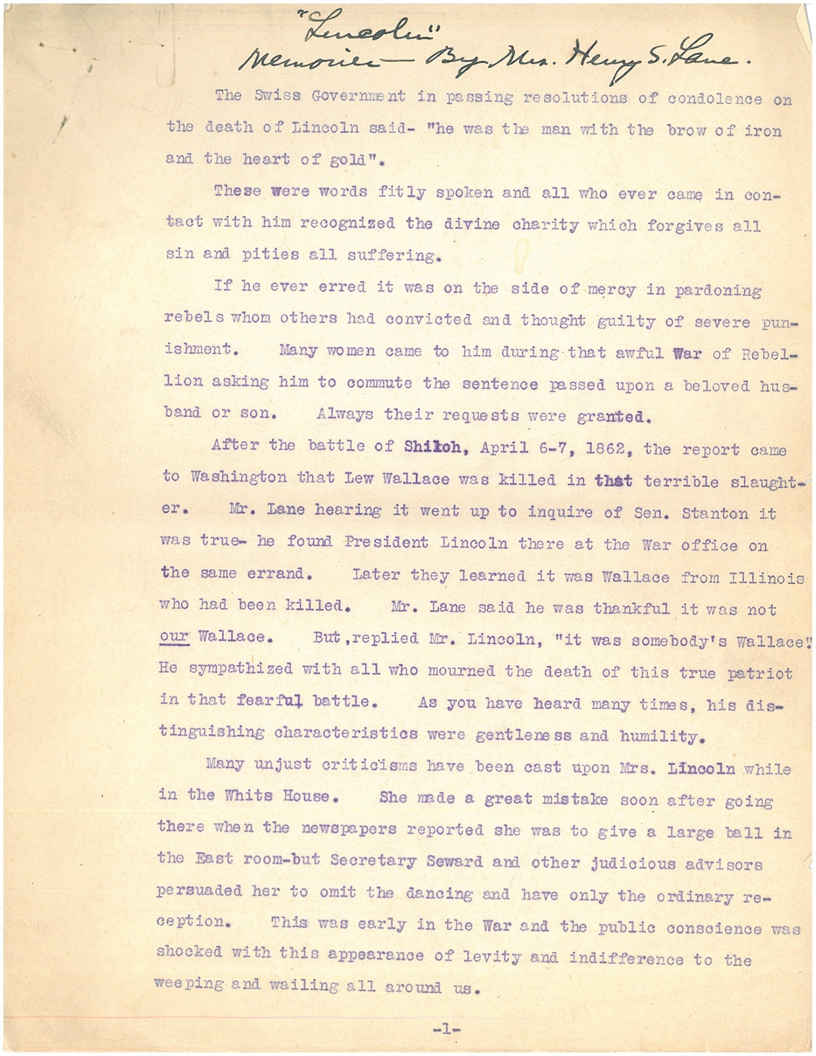
-
Description
Joanna Lane remembers Abraham Lincoln in her "Lincoln memories" after his assassination.
-
Source
Montgomery County Historical Society
-
Rights
Use of this item for research, teaching, and private study is permitted with proper citation. Reproduction of the item requires our written permission for publication, broadcast or commercial use. Request for such must be made in writing, outlining in detail the items to be reproduced and requested use of the reproduction. For permission, please contact Victoria Johnston at vjohnston@lane-mchs.org.
-
Creator
Joanna Lane
